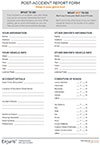There might be recourse available if you’re a victim of a hit and run accident in North Carolina
Here’s the scenario:
You’re sitting at a red light when you feel a thump from behind. As you turn to see what happened, the driver who hit the back of your car suddenly swerves around you, makes a U-turn, and heads away in the opposite direction before you get a good look.
The collision caused damage to your vehicle and you require a few doctor visits for some whiplash injuries as a result of the impact — not to mention that your neck pain prevents you from going to work for a few days.
What can you do?
You’re the victim of a hit-and-run crash.
A hit-and-run is a crime where a driver leaves the scene of an accident.
North Carolina law requires all drivers to remain at the scene of an accident until police arrive.
| If you’re involved in a crash, you must: | You may leave the scene of an accident or remove your vehicle only if you need to: |
|---|---|
|
|
What to do after a hit-and-run crash in North Carolina
You have 2 priorities after a crash. First, receive medical treatment if necessary. Second, obtain compensation for your injuries and damage to your vehicle.
The following are steps you should take after a hit-and-run crash:
- Call the police. Law enforcement has ways of finding and identifying people even if you don’t know who hit you. Even if you can’t offer any information about the car or the driver’s identity, the accident report will indicate that it was a hit-and-run, which will be essential to your insurance claim.
- Seek medical treatment. Whether you think you’re injured or not, it’s always important to obtain a medical evaluation if you were in the car when it was hit. Visit your primary doctor, an urgent care center, or a hospital emergency department. There are some injuries that don’t appear immediately — whiplash, other back and neck injuries, head injuries, and other medical conditions can show up days or weeks later. It’s crucial to have a physical record of your condition immediately following a crash. If you suffer pain or require treatment later, it will be hard to demonstrate that it’s the result of the crash if you don’t have an immediate medical exam.
- Gather evidence. The police will take a report, but your notes and observations are important, too. Take photos of the damage, the road conditions, and any other aspects of the accident scene that might provide information to the police or your insurance company.Write down any details about the vehicle or driver if you can. If you see the car, make note of the color, make and model, and any other distinguishing features. If you’re able to see the license plate number, definitely write that down and provide it to the police when they arrive. Also make note of the driver’s appearance, if possible — glasses, facial hair, height, and whether they’re wearing a specific hat. Even the color of their clothes could be helpful if the police are able to locate them quickly.
Accident Report Form
Sample post-accident report form to keep in your glove box - fill out at the scene or as soon as you can after a car accident
Download in PDF format - Call your insurance company. Many insurance companies require that a report be made within a specific amount of time after a collision, or you lose your ability to make a claim. Tell your insurance company that you’re the victim of a hit-and-run and that you’ll likely need to proceed with an uninsured motorist claim.
Uninsured motorist insurance coverage in North Carolina
North Carolina requires uninsured motorist coverage (UM). Most insurance policies include it with your other required coverage, so you probably don’t need to worry about adding it separately. The purpose of UM coverage is if you’re in an accident with a driver who doesn’t have insurance. It also provides coverage in a hit-and-run where the other driver isn’t identified.
What to do if YOU hit a parked car
You’re required to report the collision to the owner of the vehicle. If you’re able to find the owner immediately, a verbal admission would satisfy this requirement. If the driver isn’t available or identifiable right away, you must make a written report (in other words, leave a note).
Your note must include the following information:
- The time, date, and location of the accident
- Your vehicle’s license plate number and registration number
- Your name and address
- Your driver’s license number
If you don’t leave a note on the vehicle at the accident scene, you must send it to the owner by certified mail within 48 hours after the accident and a copy must also be sent to the North Carolina DMV.
If the collision isn’t with a car, but with an object like a mailbox, telephone pole, building or other structure, you must call the police or the North Carolina DMV.
3 ways to report a collision with a parked or unattended car
- Call the police
- Report the incident the owner within 48 hours of the accident
- Leave a note in a visible place on the car
What is a reportable accident?
A “reportable” accident in North Carolina is any crash that results in:
- Personal injury or death
- Property damage of $1,000 or more
- Property damage to a vehicle seized in an impaired driving incident
North Carolina hit-and-run penalties
A hit-and-run in North Carolina can either be a misdemeanor or a felony, depending on how seriously the victim is injured.
- Class 1 misdemeanor hit-and-run. A hit and run that results in property damage and/or minimal personal physical injury is Class 1 misdemeanor punishable by up to 120 days in jail and a discretionary fine.
- Class H felony hit-and-run: A hit and run that results in serious bodily injury or death is a Class H felony and is penalized by up to 25 months in prison, fines, and driver’s license suspension.
- Class F felony hit-and-run: A hit and run involving serious bodily injury (substantial risk of death, permanent disfigurement or pain, or resulting in extended hospitalization) can receive a penalty of up to 41 months in jail, significant fines, and driver’s license suspension.
Are there defenses to a hit-and-run charge?
Depending on the circumstances, a criminal defense lawyer might be able to make the argument that you’re not guilty of a hit-and-run.
Four common hit-and-run defenses include:
- You didn’t know you were involved in an accident.
- You weren’t aware that the accident caused personal injury or property damage.
- You left the scene only to get help, and then returned.
- You’re being falsely accused or mistakenly identified.
Your rights as a victim of a hit-and-run
If you’re hit by a driver who fled the accident scene, you may be able to file a claim with your own insurance company under your UM policy for injuries and property damage. However, if your injuries are severe and exceed the limits of your policy, you may need to sue the at-fault driver for your damages.
There are a couple of important factors you should know about that can affect the outcome of your hit and run case:
1. You might never learn the identity of the driver who caused your injury.
If that’s the situation, then the case will be between you and your insurance company. Compensations for your damages and injuries would fall squarely into your uninsured motorist insurance because there’s no question of fault (since you don’t know the identity of the at-fault driver).
2. If the driver is identified, a criminal case is separate from your personal injury claim.
You (a private person) cannot charge a person with a crime — only law enforcement can do that. Identifying a hit-and-run driver can, however, allow you to file a claim against their insurance company since the hit-and-run driver is the at-fault party.
You don’t have a stake in the outcome of the criminal case because you don’t stand to gain anything from a criminal conviction (except, perhaps, a sense of justice). However, a criminal conviction can help your personal injury case by serving as evidence of fault or to prove the circumstances of the damage.
Criminal attorneys (both the prosecutor and defense) might come to you or your lawyer to seek evidence of your injuries or damage. It’s often in your best interest to cooperate if you’re asked for a statement, to be a witness, or for other information that might be important evidence. Consult with your injury attorney first.
Do you need a lawyer for a North Carolina hit-and-run accident?
Your insurance company’s objective is to pay out the least amount in settlements and minimize its own exposure.
North Carolina is a pure contributory negligence state, which means a plaintiff can’t recover any damages for an accident if they’re found to bear any part of the liability. When a person flees the scene after a crash, it doesn’t necessarily mean that they bear all the fault for the crash. Your insurance company might suggest that you had some percentage of fault. Without both sides of a story, each is hard to prove.
Even if your insurance company finds that you’re not liable for the accident, it still might not offer a settlement that covers the full extent of your accident-related costs. The amount of your settlement or payout from the insurance company should cover every expense you incurred as a result of the accident — that includes medical treatment (both current and ongoing), lost wages, property damage, and any other costs that you paid for the crash.
If the settlement offered by your insurance company doesn’t cover those expenses to the full extent, you should call a personal injury lawyer immediately.
Enjuris’ free personal injury lawyer directory can help you find a North Carolina hit-and-run accident lawyer near you who’s ready to help.
See our guide Choosing a personal injury attorney.



